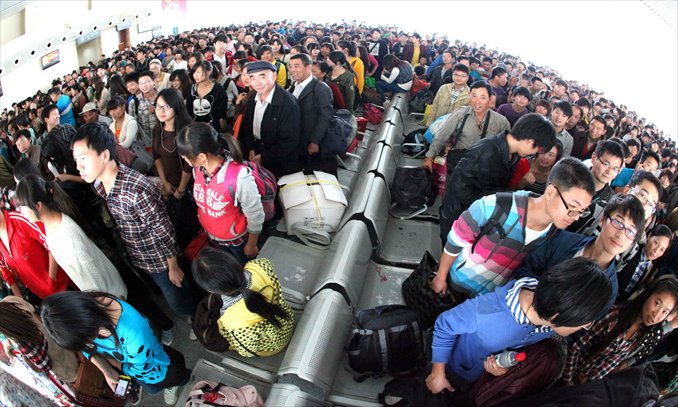Holiday travel hits record high

The National Day holiday, the most congested week in China this year, witnessed a record-high number of tourists, with millions of people jamming expressways as the holiday drew to an end Sunday.
Roads across the country have been busier than ever, fueled by a new policy that exempts passenger cars from expressway tolls during national holidays and an exceptionally long eight-day break combining the Mid-Autumn Festival on September 30 and the National Day holiday.
A record 80.87 million people traveled by road each day on average during the holiday, for a total volume of 660 million, according to the Ministry of Transport.
However, the long week has been shadowed by traffic congestion, accidents and conflicts among tourists, leading to concerns over safety and the quality of holiday relaxation.
The number of motorists on September 30 increased as much as fivefold compared to recent years, exceeding the expressway capacity in major cities including Beijing and Shanghai, according to the Ministry of Public Security. China's railways also carried a record-high number of passengers on the first day of the holiday season, totaling 9.14 million.
During the eight-day holiday that ended Sunday, more than 68,400 traffic accidents across the country killed 794 people, according to Xinhua.
Two passenger coaches collided on a highway near Zibo in East China's Shandong Province on Sunday, leaving 14 dead and more than 40 injured.
"I saw at least four traffic accidents on the expressway and cars were backed up more than 1 kilometer at peak times," said Wang Yu, a Nanjing resident who drove on a family trip to Shandong Province.
Tourists poured into China's tourist attractions during the past week, and some of the most popular ones such as the Forbidden City in Beijing and Gulangyu Island in Xiamen were described by tourists as "paralyzed," as the number of visitors reached record highs.
According to a China National Radio report, some camels at Dunhuang, a popular site in Gansu Province, dropped dead of exhaustion during the holidays because of too many tourist riders.
The Hua Mountain in Shaanxi Province, received more than 200,000 visitors during the holiday, and thousands of tourists were stranded as the cable cars were unable to handle the crowds. A couple stranded were stabbed in a conflict, according to Xinhua.
A longer holiday and the toll-free expressways are the major contributors to the overburdened traffic and tourist sites, said experts, who proposed plans to ease problems.
"The toll-free expressway policy is good for commuters and it's not to blame for the traffic pressure. Traffic accidents occur all the time and congestion always gets more serious during holidays," said Wang Limei, secretary-general of the China Road Transport Association.
"Commuters should make smart plans for the holidays and try to avoid peak traffic times and crowded sites, given we only have limited roads and transportation capacity," she noted.
Some motorists were taking this into account. Traffic into Beijing on Sunday was lighter than expected.
Liu Simin, an expert of the Tourism Research Center at the Chinese Academy of Social Sciences, suggested the May Day holiday should once again be extended to a week to ease the National Day holiday pressure. The May Day holiday, which lasted from May 1 to 7, was shortened in 2008.
But another expert suggested a different idea, allowing people to enjoy more long holidays more without altering the number of existing ones.
"People will always want more holidays, and another May Day holiday won't help," Wei Xiaoan, secretary-general of the China Tourism Leisure Association, told the Global Times.
Wei suggested Chinese alternate a week with one-day off and the next with two, so people can save six days for a long holiday every three months.
Related Report:
Holiday crowds show nation's dilemma
Travel and tourism peak witnessed around China